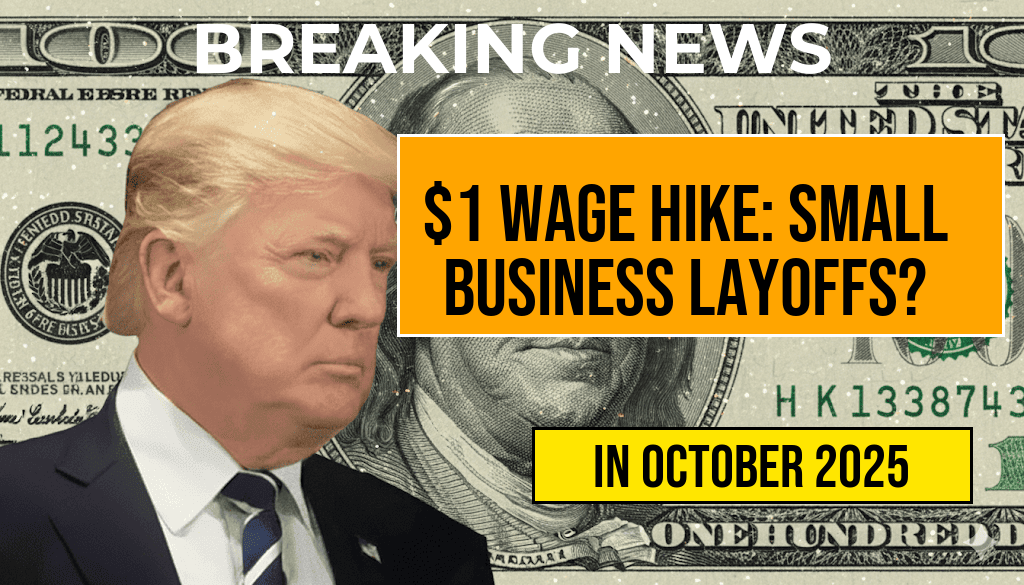The ongoing debate surrounding minimum wage increases has reached a critical point as some states and municipalities consider raising the minimum wage by $1 or more. Proponents argue that such increases are essential for improving living standards for low-income workers, while opponents warn of potential negative consequences for small businesses. As these discussions unfold, many are left wondering whether a modest wage hike could lead to increased layoffs among small business employees. This article explores the economic implications of a $1 wage increase and its potential impact on employment in the small business sector.
Understanding the Economic Landscape
The minimum wage varies significantly across the United States, with some areas implementing laws that exceed the federal baseline of $7.25 per hour. According to the U.S. Department of Labor, numerous states have adopted higher rates, reflecting a growing trend towards ensuring that wages keep pace with inflation and cost of living adjustments. However, the impact of these increases on small businesses is a critical factor in the discussion.
Potential Consequences for Small Businesses
- Increased Labor Costs: A $1 increase in the minimum wage directly raises the cost of labor for small businesses, which often operate on thin profit margins.
- Operational Adjustments: Business owners may need to reassess their budgets, potentially leading to cuts in hours, staff layoffs, or reduced hiring.
- Employee Retention: While some argue that higher wages can lead to improved employee satisfaction and retention, the financial strain may force businesses to make difficult decisions.
Small Business Perspectives
Small businesses are often seen as the backbone of the U.S. economy, employing nearly half of the nation’s workforce. According to a study by the Small Business Administration, many small employers already face challenges such as rising rents and increasing operational costs. A small wage increase could exacerbate these issues, prompting a variety of responses from business owners.
Alternatives to Layoffs
While layoffs are a possible outcome of increased wage mandates, many small businesses explore alternatives to mitigate the impact on their workforce. Strategies may include:
- Reducing Employee Hours: Instead of layoffs, some businesses may opt to cut hours for employees to manage increased payroll expenses.
- Increasing Prices: To maintain profit margins, businesses might pass some of the increased costs onto consumers through price hikes.
- Enhancing Efficiency: Investing in technology or streamlining operations can help offset labor costs, allowing businesses to retain their workforce.
Economic Research and Case Studies
Research on the effects of minimum wage increases presents a mixed picture. A study published by the National Bureau of Economic Research indicated that while some small businesses reported challenges following wage hikes, others experienced little to no impact on employment levels. In fact, some businesses reported improved employee productivity and lower turnover rates, which can counterbalance the increased labor costs.
| Study | Findings |
|---|---|
| National Bureau of Economic Research | Mixed impacts; some businesses resilient, others struggled. |
| Economic Policy Institute | Increased wages correlated with higher employee satisfaction. |
| Harvard Business Review | Higher wages led to reduced turnover costs for some sectors. |
The Bottom Line
As policymakers consider wage increases, the effects on small businesses remain a crucial aspect of the debate. While a $1 wage increase may impose additional financial pressures, the full spectrum of potential responses from small business owners illustrates a complex economic landscape. The extent to which layoffs occur may vary significantly based on industry, location, and the specific circumstances of each business. Observing how local economies adapt to these changes will be essential in shaping future wage policies.
Frequently Asked Questions
Will a $1 wage increase significantly impact small businesses?
Yes, a $1 wage increase can have varying impacts on small businesses, depending on their financial health and the industry they operate in. While some businesses may absorb the costs, others might struggle and consider layoffs.
How do small businesses typically respond to wage increases?
Small businesses often respond to wage increases by adjusting their pricing, reducing hours, or, in some cases, laying off employees to maintain profitability.
What factors influence a small business’s decision to lay off employees?
Factors include profit margins, customer demand, operational costs, and the overall economic environment. A $1 wage increase can exacerbate existing challenges and lead to difficult decisions.
Are there any benefits to increasing wages for small businesses?
Yes, increasing wages can lead to higher employee morale, reduced turnover, and increased productivity, which can ultimately benefit small businesses in the long run.
What alternatives do small businesses have instead of laying off employees?
Instead of layoffs, small businesses might consider reducing hours, implementing hiring freezes, or finding ways to improve operational efficiency to cope with increased wage costs.

Leave a Reply